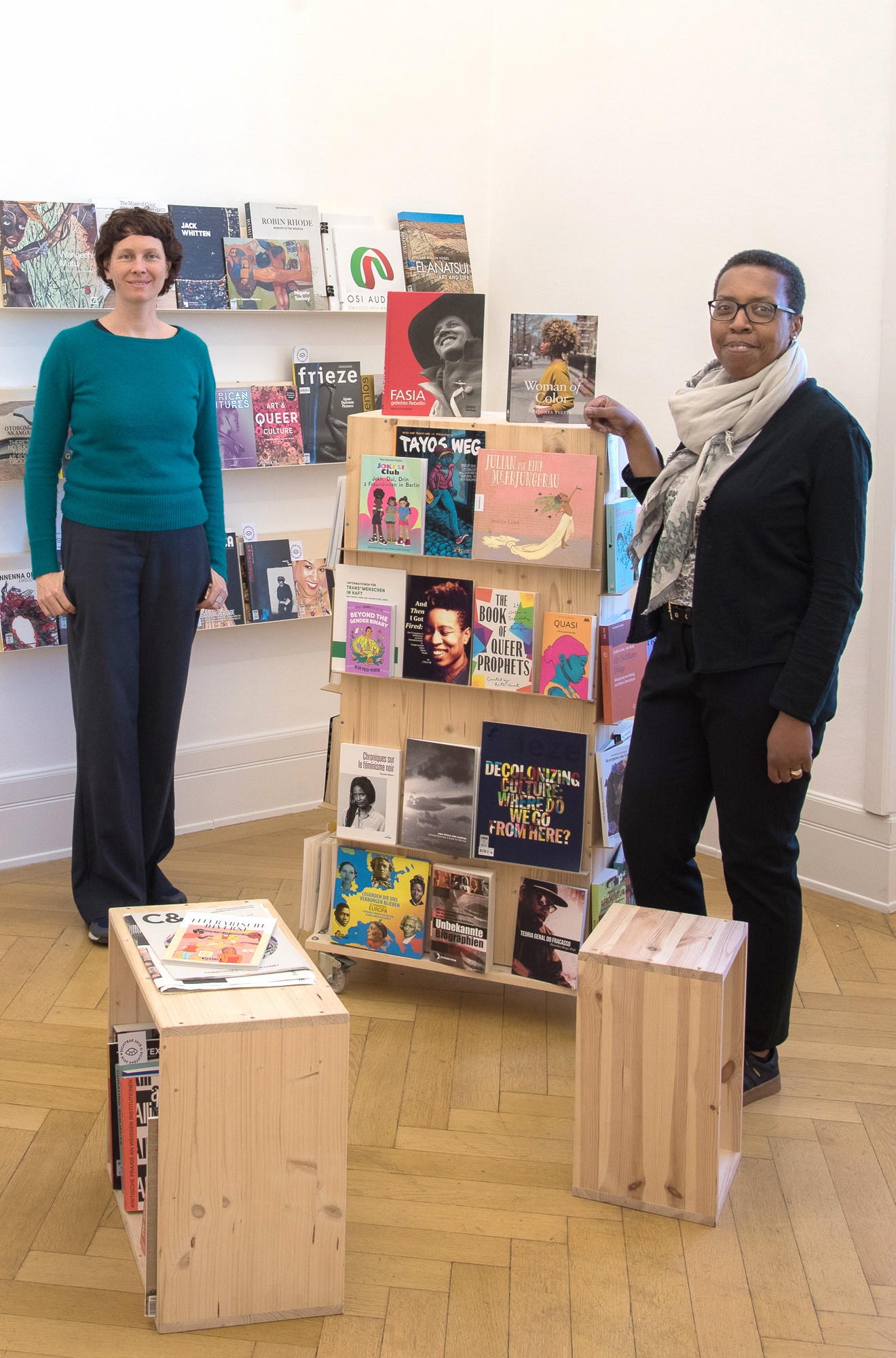The team behind Weltkulturen Education
We work along these working principles.
The team of education are Julia Albrecht and Stephanie Endter together with a group of freelancers.
- Julia Albrecht is a cultural mediator and systemic consultant. Since her master's degree in English Studies (New English Literatures and Cultures) and American Studies at the Goethe University in Frankfurt am Main, she has been working on racism-critical and post-colonial issues. As part of a second degree in social work and social pedagogy, she worked as an intern and then as a volunteer at Frankfurt's Weltkulturen Museum. Since the beginning of September 2018, she has been working in the education and outreach department of the Weltkulturen Museum. Her work focuses on diversity and outreach as well as decolonial, racism-critical approaches to education. At the Weltkulturen Museum, she co-curated the exhibition "Hidden in Plain Sight. On Making Invisible and Becoming Visible" (2021).
- Melina Angermeier studied Classical Archaeology. She is particularly interested in the material culture of both past and present societies. In addition to her work as a cultural mediator at the Weltkulturen Museum, she works as an archaeologist for monument conservation.
- Stephanie Endter has been working in the cultural sector for 20 years. She has been curator for education and outreach at the Weltkulturen Museum since 2011. Her practice is based on an anti-racist approach. Her main areas of interest are decolonization, questioning Eurocentric perspectives, joint learning and transdisciplinary collaboration.
- Claudia Gaida studied inderdisciplinary art, performance and feminism at the Akademie der Bildenden Künste in Frankfurt and in Vienna. She currently teaches in the area of aesthetic practice and social education at the Internationale Berufsakademie Darmstadt and Heidelberg.
- Gregor Glogowski works as a director, sound artist and mediator. He studied Applied Theater Studies in Giessen. He is co-founder of the artist collective Matter of Facts Studio and part of the duo Glogowski/Hoesch, whose work is shown internationally.
- Ute Hecht studied art history and general and comparative literature. Among other things, she has worked as an editor and lecturer for German as a foreign language. Currently she is working as an educator in three Museums in Frankfurt. She lived in Senegal from 2006-2011.
- Juliane Kutter studied art with a focus on photography and experimental spatial concepts in Offenbach and graduated in 2018. She works as an artist and photographer in Offenbach. In her art and also in her mediation, in the form of guided tours and workshops, she deals with the topics of the representation of bodies in society as well as the formation of opinions and the expression of these in various forms.
- Iris Loew studied cultural anthropology in Leipzig and Heidelberg with a focus on applied cultural anthropology, migration research and media anthropology. She implements socio-anthropological educational projects and teaches German as a foreign language.
- Alisa Napitupulu is a masters-student in social- and cultural anthropology in Frankfurt with a regional fochs on India (specifically: Orissa). After completing her bachelor's degree in ethnology, she was employed at the legacies database of the Frobenius-Institute.
- Alex Novaceskovic is a Master's student of Anglophone Literatures, Cultures and Media with a focus on Transcultural Anglophone Studies and Literary and Cultural History. She is particularly interested in postcolonial theories, transculturality and power-critical issues.
- Frederike Ohnewald studied social work with a focus on cultural and media education in Frankfurt. She is currently studying art history and theater studies in Mainz. As part of her studies, she completed an internship in education at the Weltkulturen Museum.
- Carina Pavlik is a Master's student of Art, Media and Cultural Education in Frankfurt. After her previous studies in social sciences with a focus on intercultural relations, she was active in political education for children and young people and now also in (art) education.
- Debora Schöbel studied geography in Erlangen and Bonn and has since worked as an education coordinator in the field of education for sustainable development. During her studies, she already focussed on post-colonial and power-critical topics.
- Irina Scelsi studied sociology and anthropology, trained as an art teacher on the side and works in Offenbach. Concerning art, she focuses on the expression of feelings and emotions and in sociology she is constantly dealing with queer-feminist and racism-critical topics.
- Matilde Vergara is a bachelor student of ethnology in Frankfurt and works as a student assistant at the Frobenius Institute, among other things for the estate archive and the project "The German ethnographic expeditions in the Australian Kimberley".
Details and registration
weekdays on 069 212 39898 or
 Stephanie Endter and Julia Albrecht (from left to right) in the exhibition “HIDDEN IN PLAIN SIGHT. From Being Rendered Invisible and Becoming Visible”
Stephanie Endter and Julia Albrecht (from left to right) in the exhibition “HIDDEN IN PLAIN SIGHT. From Being Rendered Invisible and Becoming Visible”
